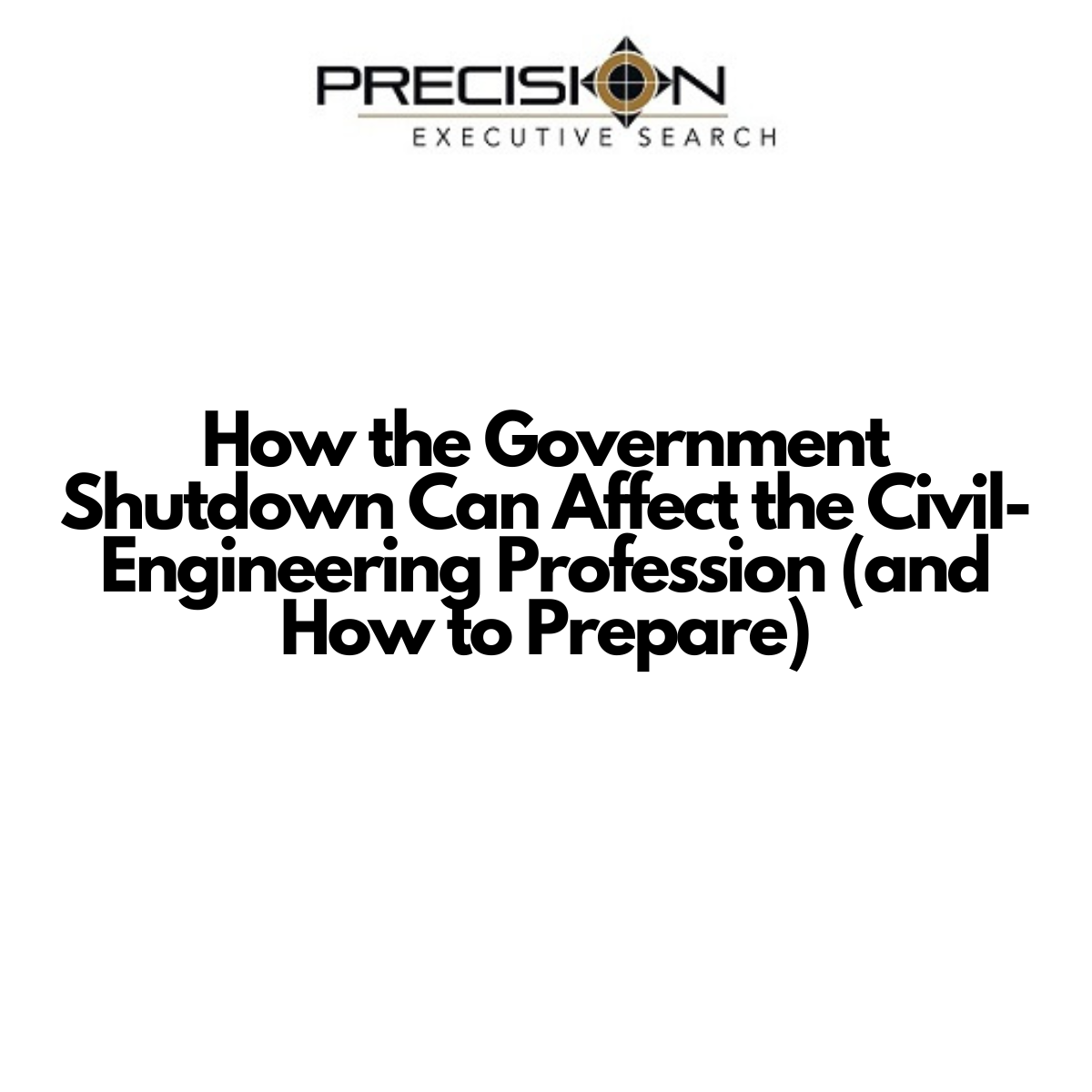
04 Nov How the Government Shutdown Can Affect the Civil-Engineering Profession (and How to Prepare)
If you work in civil engineering – whether as a designer, project manager, contractor partner, or in a firm supporting public-sector infrastructure-you should take notice of the current 2025 United States federal government shutdown. It’s not just a political headline. It has real-world implications for your pipeline of work, project funding, and job stability. Here’s how it might affect you, and what you can do to stay ahead.
How civil-engineering roles may be impacted
Here are some of the key ways the shutdown can ripple into your profession:
- Project funding & contract approvals get delayed. Because federal agencies can’t obligate new funds or approve tasks without appropriations, many public-sector construction or infrastructure projects face halts or slowdowns.
- Existing contracts may have performance disruptions. Even if a contract is funded, if it requires government personnel sign-off, site access to federal facilities, or dependent approvals, work may stagnate.
- Cash flow issues for contractors and firms. Firms working on public jobs or as subcontractors can face payment delays, which can lead to layoffs or reduced hiring.
- Less new work, more competition. Since new solicitations, contract awards or renewals may be paused, firms and engineers may feel greater competition for the available roles.
- State and local work tangentially affected. While some transport or state-funded projects may be insulated, many still rely on federal approvals or matching funds, which means they can feel the squeeze.
- Hiring and mobility slow-downs. Firms that rely on public sector projects may stall or freeze positions, meaning fewer jobs or longer time-to-hire for civil engineers.
- Uncertainty in planning & forecasting. For you as a professional, this means less predictable project start dates, less clarity on staffing needs at firms, or more caution from employers.
- Opportunity shifts. On the flip side, engineers who specialize in “essential” infrastructure or in sectors less reliant on annual appropriations may see relative advantage.
What you (as a civil engineer) can do to prepare
Here are action steps you should consider right now, especially if you’re job-searching, changing roles, or want to protect your career pathway.
- Evaluate your employer’s/project’s exposure.
Ask whether your project is federally funded, whether the contract is fully funded or incrementally funded, and whether your firm depends on federal approvals. Firms that understand this will more easily weather the shutdown. - Broaden your skill-set & target less-vulnerable sectors.
If your work is heavily tied to annual federal funding, consider adding roles in state-funded infrastructure, private sector, commercial civil engineering (industrial parks, private developments) or roles where your civil-engineering expertise can transfer. - Maintain strong performance & visibility.
In uncertain times, firms will retain high-performing engineers. Make sure you’re visible, delivering results and showing adaptability. - Stay flexible on role type & compensation.
Hiring may slow, so being open to contract roles, part-time consulting or interim assignments can help keep you active. Also keep a financial cushion if project delays affect your employer or contract. - Understand contract/firm risk and job security.
If you work for a small firm heavily reliant on government contracts, it may face higher risk of stoppage or layoffs; if possible, seek roles in firms with diversified revenue. - Network proactively.
Connect with recruiters (yes, like me), professional associations, and keep your profile active. Firms will still hire — but they may move slower or shift criteria. You want to be top of mind. - Highlight your value in uncertain times.
When interviewing, emphasize your experience handling project delays, regulatory hurdles, and changing priorities. Show you’re someone who thrives even when timelines shift. - Keep track of funding / project status.
Recognize that projects may pause rather than cancel. Ask about start-dates, “go-live” dates, and budget sources. Being informed helps you make better career decisions. - Plan for cash-flow or job gaps.
If you’re self-employed or consulting, assume some payments may be delayed. If you’re salaried, understand your employer’s exposure and if there are contingency plans. Being financially prepared reduces stress.
Final thoughts
A government shutdown doesn’t mean the #civilengineering profession grinds to a full stop. Many roles will carry on, especially those in private sector, state/local infrastructure or already-funded contracts. But what it does mean is that timing, project certainty and hiring confidence may all get shaky. For you as a civil engineer, or someone seeking civil engineering positions, the key is to be prepared, stay adaptable and stay visible.


No Comments